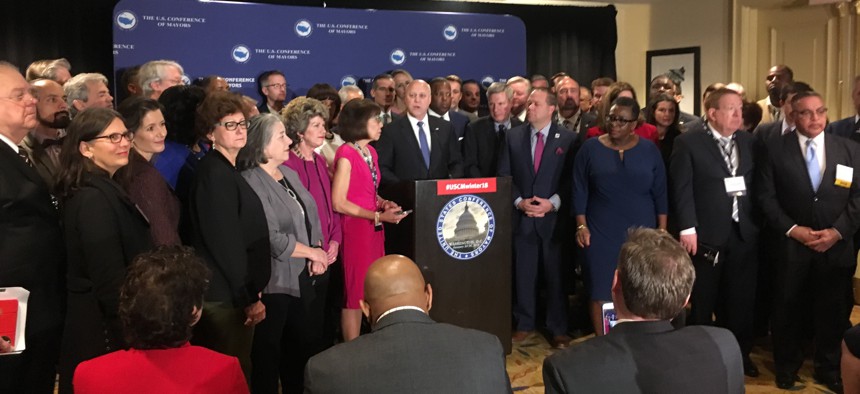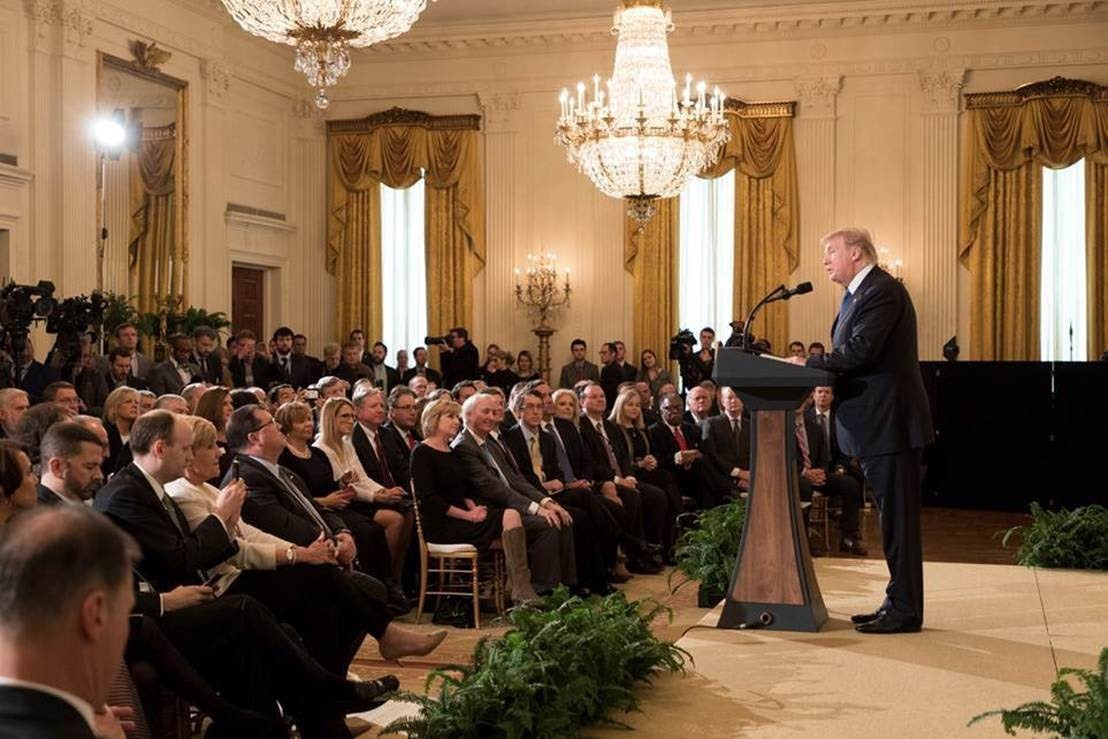Is Trump Driving a Partisan Wedge Between Mayors?

Mayors who are members of the U.S. Conference of Mayors at a press conference in Washington, D.C. on Jan. 24, 2018. Mayor Mitch Landrieu of New Orleans, the conference president, speaks from behind the podium. Route Fifty / Bill Lucia
Connecting state and local government leaders
The U.S. Conference of Mayors annual winter meeting in D.C. highlighted complicated political terrain city officials are trying to navigate.
WASHINGTON — The Trump administration's at times combative relationship with some cities will not undermine bipartisan cooperation among mayors, according to Republican and Democratic mayors from around the U.S. who gathered here last week.
The city leaders also offered a range of perspectives on what it has been like working with the White House, and serving as a mayor, since President Trump took office a little over a year ago.
For instance, two Republican mayors from smaller-sized Midwestern cities applauded the access they’d had to White House staff. Whereas the mayor of Austin, Texas, described a relationship that has been weighed down by controversies over immigration policy.
Some of the mayors pointed to other matters that complicate their work in the Trump era.
“Even being a female mayor, in the Trump administration, right? It has been difficult,” said Salt Lake City Mayor Jackie Biskupski. “There is,” she added, “coming from the president, a lot of commentary that is targeted at those of us who are minorities in some fashion.”
Last week’s 86th annual winter meeting of the U.S. Conference of Mayors got off to a turbulent start Wednesday when the Justice Department, around the same time the meeting began, threatened to take legal action against 23 states and localities if they didn’t produce documents related to immigration enforcement.
This move, which quickly turned into a national news story, caught the mayors convening here off guard. And some of them, including Conference of Mayors president, Mitch Landrieu of New Orleans, boycotted a meeting at the White House where the president spoke.
But Democratic and GOP mayors insist that the episode, and others like it involving the White House and cities, are not driving partisan wedges among the city leaders.
“I do not see what has happened this week having any impact in our ability as mayors to work together,” said Lydia Mihalik, a Republican, who is mayor of Findlay, Ohio. “If anything, I think it just underscores the fact that mayors work together regardless of party.”
“We’re actually better at that than most, from my perspective,” she added.
Austin Mayor Steve Adler offered a similar take. “The partisan debates and polarization is not something that is present at the meetings of the United States Conference of Mayors,” he said.
While he recognized the potential for party-line rifts over some issues, John Giles, mayor of Mesa, Arizona, echoed Adler and Mihalik. “I’m a Republican. I came to this organization wondering if I was going to be continually offended or treated as an outcast,” he said. “Completely the opposite,” he added. “I’ve been very warmly received.”
Mayor Jeff Longwell, of Wichita, Kansas, apparently did not feel at home with the Conference of Mayors. He said late last week, according to local news reports, he was pulling out of the group and that “it seems like they’re on this mission to truly just oppose this current administration in every form and I’m not going to be a part of it.”
The Justice Department’s action last Wednesday elicited especially punchy responses from some bigger city Democratic mayors. Bill de Blasio, of New York, fired off a tweet that said the department had “decided to renew their racist assault on our immigrant communities.”
Rahm Emanuel, of Chicago, suggested the White House was lagging on its promised infrastructure plan, and that the Justice Department announcement was meant to distract from this while the mayors were in town.
And Ted Wheeler, the mayor of Portland, Oregon, said Attorney General Jeff Sessions was “using the influence of his office to engage in a bully tactic” and that the attorney general was acting “reckless, irresponsible and dangerous.”
Mayor Bryan Barnett of Rochester Hills, Michigan, is the top Republican in the Conference of Mayors leadership.
He acknowledged it can be awkward to appear at USCM events where Democratic mayors publicly hurl tough comments at the Trump administration, like a press conference the group held last Wednesday.
“I'm always uncomfortable in those,” he said.
But Barnett stressed that it’s important to distinguish between stances individual mayors take and official conference positions. “Many of our leading Democratic mayors have very strong opinions and very strong platforms,” he said. “A tweet from Mayor de Blasio gets a ton of attention. But that's not the Conference of Mayors speaking.”
Barnett said also that he believes the White House and mayors need to maintain mutual respect for one another.
“Many Republican mayors served for eight years under president Obama and there were a lot of things that his administration did that Republican and Democratic mayors didn't agree with,” he said. “But that mutual respect is really important.”
Trump may have fallen short in helping to foster that respect when he leveled a partisan dig in a speech to the mayors who did visit the White House. “For a hundred years, the Democratic mayors have done a terrible—I mean, they've done some bad work,” he said.

“I definitely am uncomfortable with that remark,” said Mihalik, who was at the White House meeting. “I see mayors who happen to be Democrats doing some pretty incredible things.”
Giles, the Mesa mayor, was at the meeting as well.
“I was sitting there and I immediately looked at my Democratic friends and I was feeling a lot of respect for their restraint,” he said, recounting when Trump made the jab, which Giles called rather pointed and partisan. “Donald Trump was Donald Trump, and nobody was surprised by what was said,” he added. “If you were easily offended, you wouldn’t have been in the room.”
Barnett said he wished Trump hadn’t made the comment about Democrats.
Setting it aside, however, he said the White House visit yielded productive exchanges with administration officials, on issues like infrastructure. (The president is expected to discuss his pending public works plan during his State of the Union address on Tuesday.)
"I don't think you'd find a Republican or Democrat to say these aren't unusual times,” Barnett said. “We have to just kind of rise above that.”
But rising above the “unusual times” has proven to be more difficult for some cities than others.
“The attack on cities seems to have accelerated. Both at the national and at the state level,” said Adler, the Austin mayor.
“This continued effort, that feels like demonizing immigrants, demonizing cities,” he added, “is dangerous.”
Austin has been one of the jurisdictions at the center of the debate over so-called “sanctuary cities” that has simmered throughout Trump’s time in office.
The term “sanctuary city” lacks a concrete definition under federal law.
Much of the debate over the issue has hinged on legal questions involving a statute that says states and localities can’t keep their agencies or officials from communicating with federal immigration authorities about a person’s citizenship or immigration status.
“We share all the information that we get with the federal government,” Adler emphasized.
“When I would go to Washington and meet with people in the Obama administration, it was usually about learning more about best practices that other cities were doing and resources the federal government had,” he added. Under Trump, Adler said, “I’ve met with the attorney general and director of homeland security to talk about the definition of: ‘what is a sanctuary city?’”
Mihalik and Barnett both described positive, open lines of communication between their cities and the White House.
Barnett said he has the cellphone number for Billy Kirkland, Trump’s deputy director of intergovernmental affairs, and that he’d spoken with him twice in recent days.
“He answers my call every time,” Barnett said.
And Mihalik recalled how she thought it was a joke when Kirkland first called her to see if she wanted to join a group of state and local officials to discuss infrastructure issues with the White House.
“From that day on, it’s been great. And it’s been consistent communication,” she said. “It’s very refreshing.”
Reno, Nevada Mayor Hillary Schieve, who was elected in a nonpartisan race, but endorsed Democrat Hillary Clinton in the 2016 presidential contest, has had a different sort of experience.
“The last administration was very open,” she said. “The mayors had a lot of support.”
“Unfortunately we have not seen that with this administration,” she added. “Maybe as time goes by it’ll get better. But we would like to collaborate much more with the White House.”
Bill Lucia is a Senior Reporter for Government Executive’s Route Fifty and is based in Washington, D.C.

NEXT STORY: Coalitions in U.S. Cities Are Vital in Meeting Key Paris Agreement Goals



